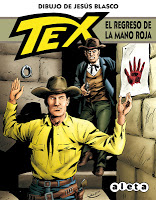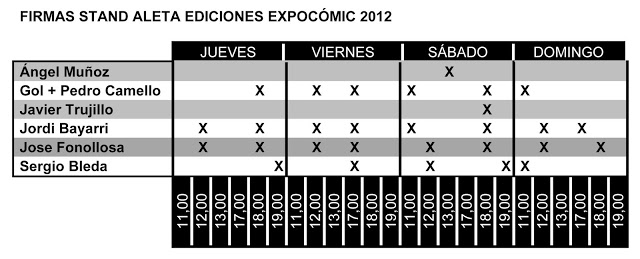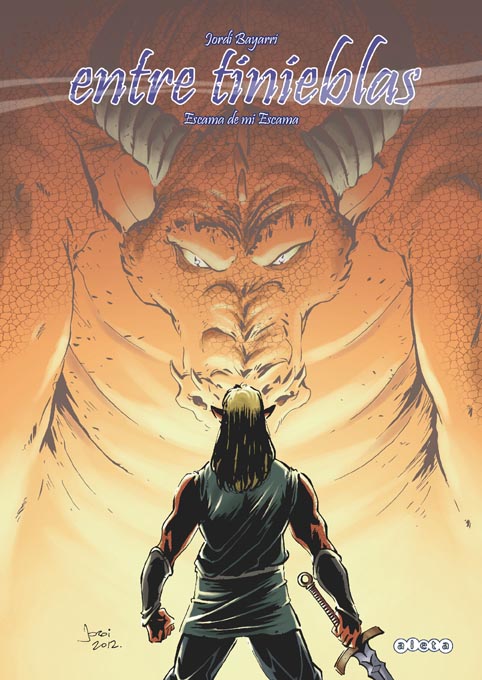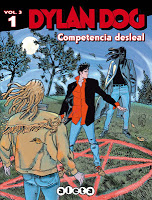Os dejamos con el cuadro de las firmas de los autores que acudirán al stand de Aleta en el inminente Expocómic de Madrid. ¡Os esperamos!
miércoles, 28 de noviembre de 2012
viernes, 23 de noviembre de 2012
¡Ya a la venta Entre Tinieblas 8!
Ya podéis encontrar a la venta en las mejores librerías una nueva etapa en el viaje que Jordi Bayarri emprendió hace años, con la serie española de fantasía más longeva del momento y ganadora de un premio Expocómic al mejor guión. Se trata, por supuesto, del capítulo 8 de Entre Tinieblas, titulado Escama de mi escama. En la web podéis conocer todo sobre la serie y ver páginas de muestra.
Los seguidores de la serie saben que cada capítulo contiene una historia completa que puede leerse independientemente, pero para los que queráis empezar desde el principio o para los que os falte algún capítulo os dejamos con la información de la colección completa.
Y para acabar, recordaros que Jordi Bayarri firmará ejemplares de sus muchas obras en el stand de Aleta durante los 4 días de Expocómic 2012.
jueves, 22 de noviembre de 2012
Reseña de Tex: Los lobos rojos
Os enlazamos con una reseña de Tex: Los lobos rojos, realizada en el blog El coleccionista de tebeos. Os recordamos que el gran Alfonso Font, dibujante de la obra, ha sido recientemente galardonado con el premio Haxtur al mejor dibujo por este mismo trabajo.
lunes, 12 de noviembre de 2012
Aleta presentará sus novedades de diciembre en Expocómic
Os dejamos con las novedades de diciembre de Aleta, que presentaremos en el próximo Expocómic. Ampliaremos la información en siguientes días.
 TEX:
EL REGRESO DE LA MANO ROJA
TEX:
EL REGRESO DE LA MANO ROJA
Guión: Claudio Nizzi
Dibujo: Jesús Blasco
208 páginas - blanco y negro - cartoné
PVP: 15,95 euros
ISBN: 978-84-15225-54-6
 INVENCIBLE ULTIMATE COLLECTION
VOL. 2
INVENCIBLE ULTIMATE COLLECTION
VOL. 2
Guión: Robert Kirkman
Dibujo: ryan Ottley
352 páginas - color - cartoné con sobrecubierta
Continuando la recopilación definitiva de la que, probablemente, sea la mejor serie de superhéroes del universo.
¿Y ahora qué?
Tras los cataclísmicos acontecimientos del tomo anterior, a Mark le toca reconstruir lo que queda de su vida. Todo ha cambiado. Su familia. Sus amigos. Sus compañeros. El mundo se ha convertido en un lugar muy distinto... y poco acogedor para nuestro joven superhéroe. Invencible deberá enfrentarse a complicadas decisiones, incontables supervillanos, amenazas de otros mundos... y a su último curso en el instituto. Nadie le dijo que ser superhéroe fuera fácil... ¡Pero tampoco le contaron que iba a ser tan complicado!
Este volumen contiene los números 14 a 24 de la serie Invencible, más el número 0 de la misma serie y el Especial de Verano de Image Comics publicado con motivo del Día del Cómic Gratis de 2004.
 EL DÍA
DEL JUICIO (2ª edición en tapa dura)
EL DÍA
DEL JUICIO (2ª edición en tapa dura)
Guión: Alan Moore
Dibujo: Rob Liefeld, Gil Kane, _Chris Sprouse, Steve Skroce, Jim Starlin, Terry Dobson.
Un asesinato en la comunidad superhumana desata un juicio sin precedentes. Nunca se ha juzgado a un superhéroe por asesinato, y menos a un miembro de Youngblood.
Descubre esta nueva edición en cartoné de la obra de ALAN MOORE y de cómo reinventa el universo de la editorial de Rob Liefeld, desde el mismísimo principio de los tiempos hasta el presente, con apariciones estelares de Supreme o Savage Dragon, en una nueva edición en cartoné.
Antes de crear su propia línea de comics, Alan Moore creó El Día del Juicio, dónde todo el género de superhéroes fue juzgado por el conocido guionista gracias al encargo de Rob Liefeld de reformular a todos sus personajes de su editorial Awesome. Para ello contó con artistas de la talla del propio Liefeld, Chris Sprouse, Jim Starlin y muchos más, entre ellos el recordado Gil Kane.
Guión: Tito
Faraci, Pasquale Ruju, Paola Barbato
Dibujo: Ugolino
Cossu, Giampero Casertano, Fabio Celoni
288
páginas - 16x21 cms. - B/N - rústica
PVP: 15,95
euros
ISBN:
978-84-15225-36-2
Volvemos a
numerar la colección de Dylan Dog con
tres capítulos completos e inéditos en España. Incluye los números 219, 220 y
221 originales.
Asesinos literarios en busca de nuevas víctimas,
perversos demonios encarnados que empujan a gente desesperada a cometer
atrocidades sin límite... y una investigadora decidida a jubilar a nuestro
detective de lo sobrenatural favorito... ¡Por primera vez nuestro héroe se
enfrenta a algo más peligroso que vampiros, hombres lobos y zombis diversos!
 TEX:
EL REGRESO DE LA MANO ROJA
TEX:
EL REGRESO DE LA MANO ROJA Guión: Claudio Nizzi
Dibujo: Jesús Blasco
208 páginas - blanco y negro - cartoné
PVP: 15,95 euros
ISBN: 978-84-15225-54-6
Luke Mac Lean, detective de la Agencia Pinkerton,
es asesinado en la ciudad de Amarillo, donde se hacía pasar por periodista del
"Morning Star", el periódico más importante de la ciudad. Mac Lean
investigaba la existencia de una misteriosa sociedad secreta de criminales
conocida como "La Mano Roja". Uno de sus miembros, sin embargo, ha
cometido un error al permitir que cierto telegrama llegase a su destino... un telegrama
en el que Mac Lean solicitaba la ayuda de dos famosos rangers... ¡Tex Willer,
"Águila de la Noche" y su inseparable compañero, Kit "Cabello de
Plata" Carson!
Lleva publicándose más de cincuenta años con cientos de miles de devotos seguidores. Para los indios navajos es Águila de la Noche, líder sabio y un hermano blanco para todos los hombres rojos. Para los blancos es el agente indio de la reserva Navajo y un Ranger de puntería infalible. Y para los bandidos que tienen la desgracia de cruzarse con él es su peor pesadilla. Una nueva aventura completa e inédita de Tex dibujada por uno de nuestros maestros de las viñetas: Jesús Blasco.
Lleva publicándose más de cincuenta años con cientos de miles de devotos seguidores. Para los indios navajos es Águila de la Noche, líder sabio y un hermano blanco para todos los hombres rojos. Para los blancos es el agente indio de la reserva Navajo y un Ranger de puntería infalible. Y para los bandidos que tienen la desgracia de cruzarse con él es su peor pesadilla. Una nueva aventura completa e inédita de Tex dibujada por uno de nuestros maestros de las viñetas: Jesús Blasco.
 INVENCIBLE ULTIMATE COLLECTION
VOL. 2
INVENCIBLE ULTIMATE COLLECTION
VOL. 2Guión: Robert Kirkman
Dibujo: ryan Ottley
352 páginas - color - cartoné con sobrecubierta
PVP: 34,95 euros
Co-edición con
Dolmen Editorial
ISBN: 978-84-15225-53-3
ISBN: 978-84-15225-53-3
Continuando la recopilación definitiva de la que, probablemente, sea la mejor serie de superhéroes del universo.
¿Y ahora qué?
Tras los cataclísmicos acontecimientos del tomo anterior, a Mark le toca reconstruir lo que queda de su vida. Todo ha cambiado. Su familia. Sus amigos. Sus compañeros. El mundo se ha convertido en un lugar muy distinto... y poco acogedor para nuestro joven superhéroe. Invencible deberá enfrentarse a complicadas decisiones, incontables supervillanos, amenazas de otros mundos... y a su último curso en el instituto. Nadie le dijo que ser superhéroe fuera fácil... ¡Pero tampoco le contaron que iba a ser tan complicado!
Este volumen contiene los números 14 a 24 de la serie Invencible, más el número 0 de la misma serie y el Especial de Verano de Image Comics publicado con motivo del Día del Cómic Gratis de 2004.
 EL DÍA
DEL JUICIO (2ª edición en tapa dura)
EL DÍA
DEL JUICIO (2ª edición en tapa dura) Guión: Alan Moore
Dibujo: Rob Liefeld, Gil Kane, _Chris Sprouse, Steve Skroce, Jim Starlin, Terry Dobson.
168 páginas -
color - cartoné
PVP: 19,95 euros
ISBN: 978-84-15225-56-0
PVP: 19,95 euros
ISBN: 978-84-15225-56-0
Un asesinato en la comunidad superhumana desata un juicio sin precedentes. Nunca se ha juzgado a un superhéroe por asesinato, y menos a un miembro de Youngblood.
Descubre esta nueva edición en cartoné de la obra de ALAN MOORE y de cómo reinventa el universo de la editorial de Rob Liefeld, desde el mismísimo principio de los tiempos hasta el presente, con apariciones estelares de Supreme o Savage Dragon, en una nueva edición en cartoné.
Antes de crear su propia línea de comics, Alan Moore creó El Día del Juicio, dónde todo el género de superhéroes fue juzgado por el conocido guionista gracias al encargo de Rob Liefeld de reformular a todos sus personajes de su editorial Awesome. Para ello contó con artistas de la talla del propio Liefeld, Chris Sprouse, Jim Starlin y muchos más, entre ellos el recordado Gil Kane.
Guión: Robert
Kirkman
Dibujo: Tony
Moore y Cliff Rathburn
176
páginas - 17x24 cms. - color - rústica
PVP: 15,95
euros
Co-edición
con Dolmen Editorial
ISBN:
978-84-15225-37-9
Antes de “Los
muertos vivientes”, sus creadores Robert Kirkman y Tony Moore realizaron lo que
el conocido guionista describió como “un cómic de superhéroes ultraviolento”:
BRIT. No te pierdas las primeras aventuras de uno de los mejores personajes de
Kirkman, coloreadas para la ocasión por Val Staples. Incluye bocetos y
comentarios de los autores.
¡En enero de
2013 redistribuiremos el volumen 2 de Brit, y en febrero cerramos la colección
con el tercer y último volumen!
El sexo y la
violencia nunca han sido tan… VIEJOS. Te presentamos a BRIT, la última línea de
defensa del gobierno en lo que se refiere a temas tan peliagudos como mantener
el mundo a salvo. Cuando las amenazas superpoderosas se ciernan sobre nuestro
territorio, llamad a Brit. Cuando algún dictador loco conquiste los países
vecinos para controlar sus recursos, llamad a Brit. Cuando los extraterrestres
tomen la Luna para usarla como base desde la que invadirnos a lo bestia…
bombardeadla con misiles nucleares de la hostia… y enviad a Brit para
deshacerse de los que queden. Brit es una máquina asesina humana,
indestructible, imparable… y cumple los requisitos para los descuentos de la
tercera edad.
Autor: Jordi Bayarri
64 páginas - 17x24 cms. - Color - rústica
PVP: 9,00
euros
ISBN: 978-84-938746-8-1
Beryl oye
una voz. Una voz poderosa y grave que le reclama. Así, decide
dejar que sus amigos busquen al Morador de la Penumbra y parte sólo
hacia una montaña. Una montaña en la que mora un dragón. Allí se
encontrará cara a cara con su pasado, pero también con su futuro.
Y deberá entablar un combate a vida o muerte por su herencia.
Mientras,
Desdraj, Eilyrn y Talee se las verán con nuevos personajes
que enmarañarán aún más la tupida red que los Señores de la Sima han
han tendido sobre Anthaggar.
Un nuevo episodio de Entre
Tinieblas, la saga de fantasía heroica española más leída de los últimos
tiempos, ganadora del premio Expocómic 2007 al mejor guión.
miércoles, 31 de octubre de 2012
Los mejores cómics italianos se abren hueco en el complicado mercado español
Copiamos el título de este post de la reseña de Tex, Julia y Dampyr de RTVE que os enlazamos a continuación.
Presentación de Cruz Negra en Alcántara
Los que podáis acercarse a Alcántara no debéis perderos la Cruz Negra, la nueva obra de Gol y Pedro Camello. La presentación tendrá lugar en la Biblioteca Pública Municipal de Alcántara, el día 31 de octubre a las 19:30 horas.
Os dejamos con las primeras páginas del volumen, así como información de la obra:
EscenarioLa acción transcurre a principios del siglo XIII al oeste de la Península Ibérica, en el territorio conocido como Extremadura, zona de frontera entre los reinos cristianos del Norte y los musulmanes del Sur.
En Tierra Santa continúan las cruzadas pero aquí, en la Península, se desarrolla otra guerra de religión entre los mismos contendientes.
En medio de esas guerras religiosas está el pueblo llano que sólo quiere sobrevivir, sufriendo las inclemencias de la naturaleza y el salvajismo de los guerreros, ciegos de fanatismo e ira.
Los protagonistas
Los protagonistas son dos caballeros de Alcántara, orden religiosa de monjes guerreros nacida a semejanza de los templarios, cuya declarada misión es la protección de los cristianos y el exterminio de los musulmanes.
Frey Juan es un monje caballero impecable, conocido en la frontera como Cruz Negra, pues la cruz verde de su hábito de Alcántara, constantemente teñida con la sangre de sus enemigos, se ha vuelto negra.
Frey Alonso, su compañero de correrías, es amigo del vino, las mujeres y la buena vida. Se hace difícil de entender por qué tomó los votos monacales.
En Tierra Santa continúan las cruzadas pero aquí, en la Península, se desarrolla otra guerra de religión entre los mismos contendientes.
En medio de esas guerras religiosas está el pueblo llano que sólo quiere sobrevivir, sufriendo las inclemencias de la naturaleza y el salvajismo de los guerreros, ciegos de fanatismo e ira.
Los protagonistas
Los protagonistas son dos caballeros de Alcántara, orden religiosa de monjes guerreros nacida a semejanza de los templarios, cuya declarada misión es la protección de los cristianos y el exterminio de los musulmanes.
Frey Juan es un monje caballero impecable, conocido en la frontera como Cruz Negra, pues la cruz verde de su hábito de Alcántara, constantemente teñida con la sangre de sus enemigos, se ha vuelto negra.
Frey Alonso, su compañero de correrías, es amigo del vino, las mujeres y la buena vida. Se hace difícil de entender por qué tomó los votos monacales.
lunes, 29 de octubre de 2012
¡Llega Cruz Negra!
Este viernes 2 de noviembre verá la luz Cruz Negra, la nueva obra de Gol y Pedro Camello. Antes de invitaros a la presentación de la obra, no podéis perderos el siguiente video:
Suscribirse a:
Entradas (Atom)










